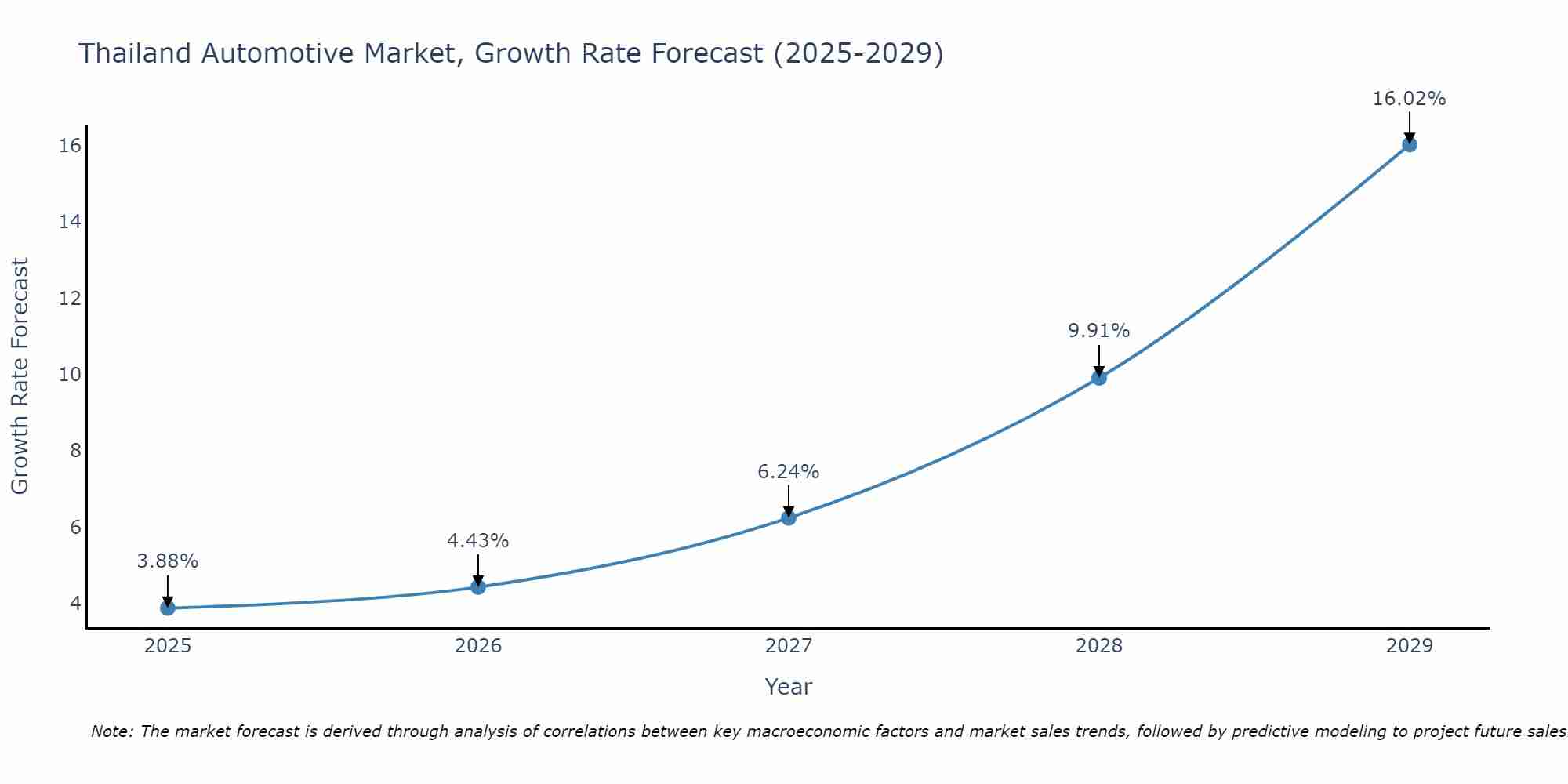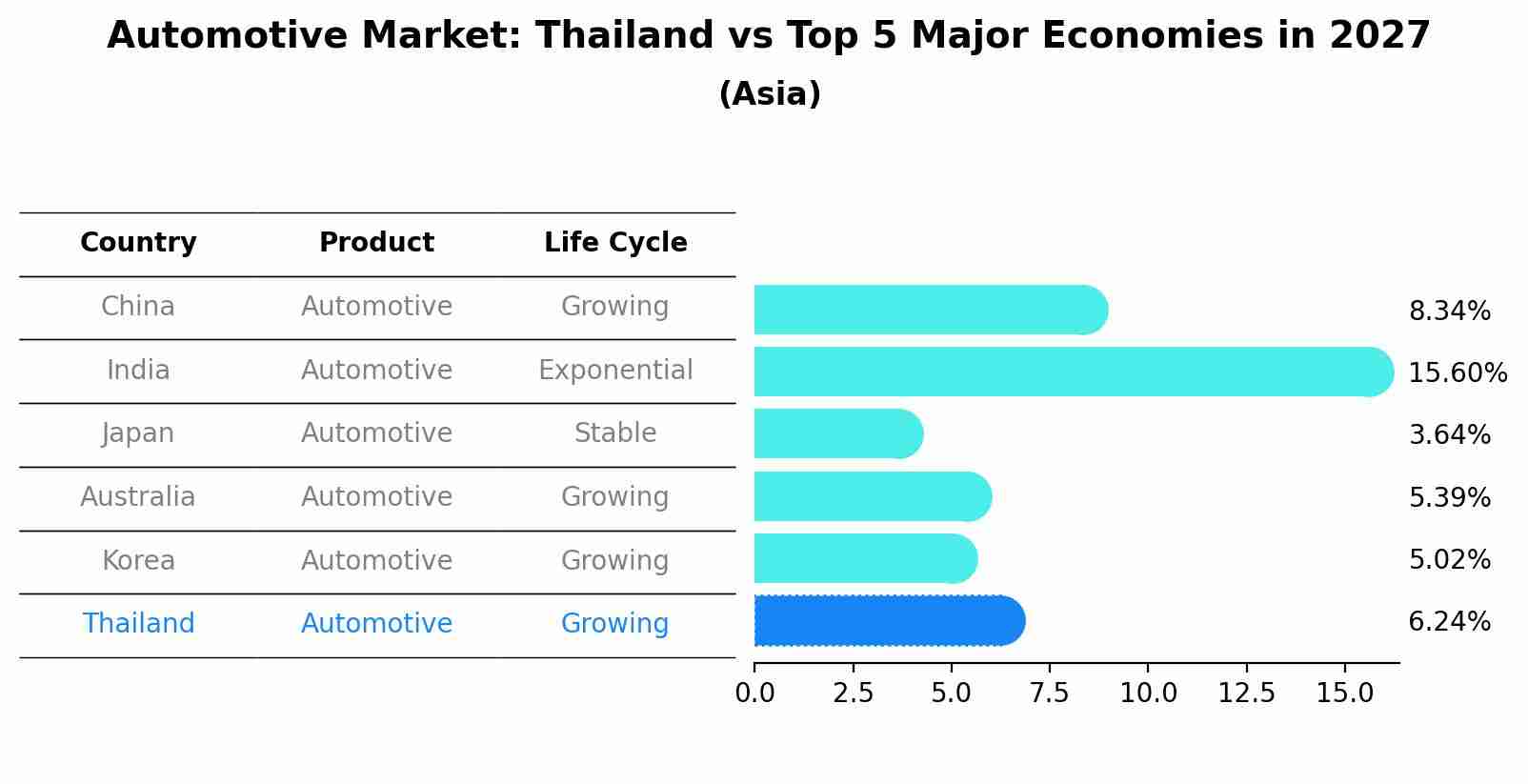Thailand Automotive Market (2023-2029) Outlook | Value, Forecast, Size, Trends, Share, Companies, Growth, Analysis, Industry, COVID-19 IMPACT & Revenue
Market Forecast By Product Type (Electric, Hybrid Electric, Plug-In Hybrid Electric, Mild Hybrid, Natural Gas, Fuel Cell Electric, Diesel, Petrol) And Competitive Landscape
| Product Code: ETC431781 | Publication Date: Oct 2022 | Updated Date: May 2024 | Product Type: Market Research Report | |
| Publisher: 6Wresearch | No. of Pages: 75 | No. of Figures: 35 | No. of Tables: 20 | |
Thailand Automotive Market Size Growth Rate
The Thailand Automotive Market is poised for steady growth rate improvements from 2025 to 2029. Commencing at 3.88% in 2025, growth builds up to 16.02% by 2029.

Automotive Market: Thailand vs Top 5 Major Economies in 2027 (Asia)
By 2027, Thailand's Automotive market is forecasted to achieve a growing growth rate of 6.24%, with China leading the Asia region, followed by India, Japan, Australia and South Korea.

Topics Covered in the Thailand Automotive Market
The Thailand Automotive Market report thoroughly covers the market by product type. The market outlook report provides an unbiased and detailed analysis of the ongoing market trends, opportunities/high growth areas, and market drivers which would help the stakeholders to devise and align their market strategies according to the current and future market dynamics.
Thailand Automotive Market Synopsis
Thailand Automotive Market is one of the well-established industries and the country is a major hub for car production in Southeast Asia. The automotive market has been influenced by government policies, export demand, and changing consumer preferences. Apart from this, growing interest in electric and hybrid vehicles and incentives for the automotive industry and efforts to promote eco-friendly vehicles are some of the major trends in the market.
According to 6Wresearch, the Thailand Automotive Market Size is projected to amount to US$12.67bn during the forecast period of 2023-2029. The government has implemented policies and provided incentives to attract automotive manufacturers, including tax breaks, investment promotion measures, and infrastructure development. Also, the country boasts a well-developed automotive manufacturing ecosystem, including a skilled labor force and modern production facilities. Moreover, surging consumer demand and rapid urbanization have led to a growing middle class with higher purchasing power, driving demand for passenger cars and motorcycles. However, Thailand faces intense competition from other automotive hubs globally, including countries in the ASEAN region, China, and India.
Further, the industry is under pressure to adopt more sustainable and eco-friendly practices, including the production of electric vehicles (EVs) and the reduction of emissions. Apart from this, there is a growing emphasis on the development and adoption of electric and hybrid vehicles, driven by environmental concerns and technological advancements. There are opportunities for investment in the production of electric vehicles and their components. The future of the Thailand automotive market is anticipated to be shaped by continued advancements in technology, particularly in the electric and autonomous vehicle segments.
Government policies and schemes introduced in the Thailand Automotive Market
Thailand has implemented various government policies and schemes to support the automotive industry. These policies attract investment, foster technological advancements, and ensure sustainable growth. There are various key government policies and schemes introduced in the Thailand automotive industry including the Eco Car Program. This program was launched to encourage the production of environmentally friendly vehicles. It provides incentives for manufacturers to produce energy-efficient and low-emission vehicles. Participants in the program receive tax privileges and other benefits. Moreover, the Thailand Board of Investment (BOI) offers various incentives to automotive manufacturers and related industries. These incentives include tax exemptions, import duty reductions, and other financial benefits for companies that invest in specific activities related to the automotive sector.
Market Analysis by Product Type
According to Shivani, Senior Research Analyst, 6Wresearch, electric vehicles (EVs) and plug-in hybrid electric vehicles (PHEVs) are expected to dominate the Thailand Automotive Market Share in the future years due to government incentives, an increasing focus on environmental sustainability, and improvements in charging infrastructure.
Key Players in the Thailand Automotive Market
The market is highly competitive with the presence of various prominent players such as:
- Toyota Motor Corporation
- Honda Motor Co., Ltd.
- Isuzu Motors Limited
- Ford Motor Company
- Nissan Motor Co., Ltd.
Key attractiveness of the report
- COVID-19 Impact on the Market.
- 10 Years Market Numbers.
- Historical Data Starting from 2019 to 2022.
- Base Year: 2022.
- Forecast Data until 2029.
- Key Performance Indicators Impacting the Market.
- Major Upcoming Developments and Projects.
Key Highlights of the Report:
- Thailand Automotive Market Outlook
- Market Size of Thailand Automotive Market, 2022
- Forecast of Thailand Automotive Market, 2029
- Historical Data and Forecast of Thailand Automotive Revenues & Volume for the Period 2019-2029
- Thailand Automotive Market Trend Evolution
- Thailand Automotive Market Drivers and Challenges
- Thailand Automotive Price Trends
- Thailand Automotive Porter's Five Forces
- Thailand Automotive Industry Life Cycle
- Historical Data and Forecast of Thailand Automotive Market Revenues & Volume By Product Type for the Period 2019-2029
- Historical Data and Forecast of Thailand Automotive Market Revenues & Volume By Electric for the Period 2019-2029
- Historical Data and Forecast of Thailand Automotive Market Revenues & Volume By Hybrid Electric for the Period 2019-2029
- Historical Data and Forecast of Thailand Automotive Market Revenues & Volume By Plug-In Hybrid Electric for the Period 2019-2029
- Historical Data and Forecast of Thailand Automotive Market Revenues & Volume By Mild Hybrid for the Period 2019-2029
- Historical Data and Forecast of Thailand Automotive Market Revenues & Volume By Natural Gas for the Period 2019-2029
- Historical Data and Forecast of Thailand Automotive Market Revenues & Volume By Fuel Cell Electric for the Period 2019-2029
- Historical Data and Forecast of Thailand Automotive Market Revenues & Volume By Diesel for the Period 2019-2029
- Historical Data and Forecast of Thailand Electric Automotive Market Revenues & Volume By Petrol for the Period 2019-2029
- Thailand Automotive Import Export Trade Statistics
- Market Opportunity Assessment By Product Type
- Thailand Automotive Top Companies Market Share
- Thailand Automotive Competitive Benchmarking By Technical and Operational Parameters
- Thailand Automotive Company Profiles
- Thailand Automotive Key Strategic Recommendations
Market Covered
The report offers a comprehensive study of the subsequent market segments:
By Product Type
- Electric
- Hybrid Electric
- Plug-In Hybrid Electric
- Mild Hybrid
- Natural Gas
- Fuel Cell Electric
- Diesel
- Petrol
Thailand Automotive Market (2023-2029) | FAQs
- Single User License$ 1,995
- Department License$ 2,400
- Site License$ 3,120
- Global License$ 3,795
Search
Related Reports
- Middle East OLED Market (2025-2031) | Outlook, Forecast, Revenue, Growth, Companies, Analysis, Industry, Share, Trends, Value & Size
- Taiwan Electric Truck Market (2025-2031) | Outlook, Industry, Revenue, Size, Forecast, Growth, Analysis, Share, Companies, Value & Trends
- South Korea Electric Bus Market (2025-2031) | Outlook, Industry, Companies, Analysis, Size, Revenue, Value, Forecast, Trends, Growth & Share
- Vietnam Electric Vehicle Charging Infrastructure Market (2025-2031) | Outlook, Analysis, Forecast, Trends, Growth, Share, Industry, Companies, Size, Value & Revenue
- Vietnam Meat Market (2025-2031) | Companies, Industry, Forecast, Value, Trends, Analysis, Share, Growth, Revenue, Size & Outlook
- Vietnam Spices Market (2025-2031) | Companies, Revenue, Share, Value, Growth, Trends, Industry, Forecast, Outlook, Size & Analysis
- Iran Portable Fire Extinguisher Market (2025-2031) | Value, Forecast, Companies, Industry, Analysis, Trends, Growth, Revenue, Size & Share
- Philippines Animal Feed Market (2025-2031) | Companies, industry, Size, Share, Revenue, Analysis, Forecast, Growth, Outlook
- India Lingerie Market (2025-2031) | Companies, Growth, Forecast, Outlook, Size, Value, Revenue, Share, Trends, Analysis & Industry
- India Smoke Detector Market (2025-2031) | Trends, Share, Analysis, Revenue, Companies, Industry, Forecast, Size, Growth & Value
Industry Events and Analyst Meet
Our Clients
Whitepaper
- Middle East & Africa Commercial Security Market Click here to view more.
- Middle East & Africa Fire Safety Systems & Equipment Market Click here to view more.
- GCC Drone Market Click here to view more.
- Middle East Lighting Fixture Market Click here to view more.
- GCC Physical & Perimeter Security Market Click here to view more.
6WResearch In News
- Doha a strategic location for EV manufacturing hub: IPA Qatar
- Demand for luxury TVs surging in the GCC, says Samsung
- Empowering Growth: The Thriving Journey of Bangladesh’s Cable Industry
- Demand for luxury TVs surging in the GCC, says Samsung
- Video call with a traditional healer? Once unthinkable, it’s now common in South Africa
- Intelligent Buildings To Smooth GCC’s Path To Net Zero













